
 |
||
|
::: Five NTU Professors Ascend to Glory by Winning Awards from |
||
|
The Council of Academic Reviewal & Evaluation of the Ministry of Education announced the winners of its 14th National Chair Professorship Award and the 54th Academic Award recently. NTU has five professors winning these awards, demonstrating the academic excellence of our university. Naturally, we share the glory and jubilation of these faculty members. The 14th National Chair Professorship Award has five winners in separate Categories, NTU’s winners are as follows: Category of Biology, Medicine and Agriculture: Professor Che-Ming Teng The 54th Academic Award has nine winners in separate categories, NTU’s winners are as follows: Category of Math and Natural Sciences: Professor George Wei-Shu Hou Below are the biographical profiles of the NTU professors:
Starting from 2003, Professor Teng was commissioned as the general convener of “The National Science and Technology Program for Biotechnology and Pharmaceuticals”. At this position, he integrated the drug R&D resources of the National Science Council, the Ministry of Economic Affairs and the Department of Health and established a full R&D system for new drugs, herbs, and bio-active medicine. Later on, he established a “academic/industry bridging office”, which was instrumental in conducting the technical evaluation, the patent and market analysis of upstream R&D results and in expediting university/industry cooperation and in promoting industrial development. In essence, he was the leader towards the goal of Taiwan making new drugs on its own. Owing to his excellence in research, Professor Teng has received numerous awards, including: The National Science Council’s Outstanding Research Award (1985-1997), the Zhongshan Academic Award (1988), the Executive Yuan Outstanding Applied Science and Technology Award (1990), the Ministry of Education Academic Award (1994), National Science Council Special Research Project (1998-2003), the Executive Yuan Science and Technology Distinguished Honor Award (2005). Insofar as teaching is concerned, he received the Good Teacher award from Ministry of Education (1998), the Distinguished Teaching Award from NTU (2000, 2006). He is Now Distinguished Professor with tenure at our University (from 2006).
Professor Wang’s area of specialization lies in microwave integrated circuits, and his research interests include circuit design, device modeling and measurements. His research findings are widely applied in wireless communication, national defense and astronomy. When he was working in the United States, he was mainly concerned about the MMIC effects of III-V semiconductors (GaAs and InPs), and he was one of the scholars who got involved at an early phase, as he had many papers published in first class journals and international conferences. In recent years his research focused on the analysis and design techniques of microwave and millimeter wave integrated circuit (MMIC),and he succeeded in transferring his techniques to silicon based high frequency RF circuits(RFIC). His cooperation with TSMC achieved many breakthroughs, in which he obtained the state of the art results in silicon based millimeter circuits. One of the most significant results is the design of SiGe BICMOS process 60 GHz transmitter, which is a high integration system chip that has the oscillator, the mixer, and the antenna all designed in the same chip. In addition, he also developed a CMOS 6 port transceiver system, a millimeter wave band CMOS high power amplifier, and a broadband voltage-controlled oscillator with continuous variables. Owing to his outstanding performances, Professor Wang received the Outstanding Research Award from the National Science Council. He was elected IEEE fellow, and he won the Pan Wen-Yuan Foundation Research Excellence Award. In 1977 he was voted the IEEE Distinguished Microwave Lecturer, and he was the first Chinese scholar to win this honor; in the same year, he won the 51th Academic Award from the Ministry of Education, as the faculty team of the radio telecommunication group of the Institute of Communication Engineering under his leadership became the “Science 50—NSC 50 scientific achievements” team. Professor Wang is now distinguished professor with tenure at our university(from 2007). That he won the 2010 National Chair Professorship Award from the Ministry of Education is no doubt a reconfirmation of his outstanding performances.
The major achievements of Professor Hou’s research lie in his multi-faceted exploration of B meson decay and CP violation, especially in the new physical Effects triggered by fourth generation quarks and charged Higgs. Several years ago, he pointed out that fourth generation quarks could enhance the intensity of CP violation by Kobayashi Maskawa by millions of times, or could explain why the anti-matters in the universe disappeared. In the area of experiments, he established the high energy physics team at NTU, which had many discoveries in Belle experiments, including the finding of direct CP violations in 2004, and the finding of the differentials in direct CP violations caused by charged and neutral B mesons. The results of this discovery was published in “Nature.” Professor Hou’s forte lies in his unique ability to combine theory and experiment to bring the CMS experiments to an even higher level.
Professor Cheng is very actively involved with translational cancer research, so far he has published more than 200 articles in internationally renowned journals, and the topics of which covered hepato-cellular carcinoma, gastric cancer, lymphoma, breast cancer and other areas. At present, the focus of his research is mainly concerned about the target therapy of hepatocellular carcinoma molecules and the basic and clinical research of the lymphoma of gastric mucosa-associated tissues. He is also now the host of several large scale international research projects. Professor Cheng has received several Outstanding Research Award from the National Science Council, the “Cancer Research Excellence Award” from the Chinese Society of Oncology, and he was the winner of Executive Yuan’s Distinguished Award in Science and Technology in 2009. In addition, he was invited to become a member of the editorial board of famous journals such as “Oncology-Basel”, “Targeted Oncology-France” and “APICO.” Since May, 2009, he is the Chairman of the Chinese Society of Oncology. The major academic achievements of Professor Cheng are: Additionally, Professor Cheng’s research team did a study on HP independent gastric MALtoma, and discovered the feasibility of Bcl-10 and NF-kB as biological markers. The team members went one step further to elucidate the biological mechanisms of HP independents, and methods to overcome the potency of drugs. The development of the latter has pushed the treatment of HP independent gastric MALToma one step forward. These achievements are not only immediately beneficial to patients, but are academically innovative in and of themselves in the first place. They can be said to be the realization of the ideas of translational medicine—the Bench Beside. The accumulation of this series of research led Dr. Cheng to be invited by American Association for Cancer Research to deliver a special topic speech at its 100 year anniversary (2008, Hong Kong). And he was given the Distinguished Science and Technology Award by the Executive Yuan in March, 2009.
Professor Yang’s research interests are wide and varied, but are mainly concerned with basic studies, and supplemented by applications. He is dedicated to the study of computational fluids and related hydraulics and hydrology, and is known for his major breakthrough in non-grid computational methods. The scope of applications of his findings are very wide, including computational fluids, computational mechanics, computational hydraulics and hydrology, computational medicine, computational heat, etc. In fact, his findings can even be applied to the positive and inverse algorithm problems of computational electromagnetics or computational finance, so he was widely recognized by the international academic society. Professor Yang’s research achievements are quite bountiful. So far he has published more than 140 articles in renowned journals , 20 chapters in special monographs, and 240 conference papers. In the area of engineering applications, he was a chief consultant for major domestic water infrastructure projects, as he lent his advice to the reservoirs, rivers, dams, water resource development, urban drainage projects. He was greatly counted upon and praised by government agencies and private enterprises alike. Additionally, in areas of non-grid computing methods, he actively sought to cooperate with domestic enterprises to develop advanced computing software and foster international competitiveness. Professor Yang has been actively involved with academic activities both at home and abroad, and he spared no efforts in promoting the academic standards of Taiwan. He was a member of the editorial board of CMC-Computers, Materials & Continua (“SCI), Journal of the Chinese Institute of Engineers (SCI). He is now Editor-in-Chief of Structural Longevity (SCI). Professor Yang’s excellence in research in duly noted, as he received the Outstanding Research Award from the National Science Council three times (1992, 1994, and 1996), and was appointed a special research fellow of the National Science Council in 1998 and 2001. In 2005 he won the special research fellow award from the National Science Council, and in 2004 and 2005 he won the Zhang-zhang Tsung Chair Professorship Award and Life Honor, in 2006 he won the Sung Fangdo Medal in Mechanics from the Society of Theoretical and Applied Mechanics of the Republic of China. He became a Distinguished Professor with tenure of NTU in 2006 and a fellow of the Society of Theoretical and Applied Mechanics of the Republic of China. After twenty some years of non-stopping teaching and research, and the tireless efforts and dedication of his research team composed of hundreds of graduate students, Professor Yang’s contributions received a high degree of recognition from the academic circles and won the 54th Academic Award from the Ministry of Education. |
||
No. 1, Sec. 4, Roosevelt Road, Taipei, 10617 Taiwan(R.O.C.)
Phone: +886-2-3366-3366 Fax: +886-2-2362-7651
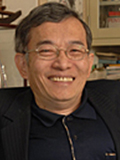 The National Chair Professorship Award winner in the category of biology, medicine, and agriculture is Professor Che-Ming Teng who received his doctorate in pharmacology from National Taiwan University in 1977. Later on he won the NIH Forgaty International Fellowship and studied physiology at the Wayne State University of the United States (1979-1981). Professor Teng has served for forty years at NTU’s Department of Pharmacology, School of Medicine. His research started with local Taiwanese themes—such as snake venom, and evolved to herbs of traditional Chinese medicine as well as synthetic chemical compounds. Through collaboration with domestic and foreign chemical and pharmaceutical researchers and division of labor by areas of specialization, he was instrumental in spurring the inter-disciplinary integration of the research teams of Taiwan with a view toward improving the international academic status of our country. Professor Teng’s major research achievements had to do with drug discovery, as he explored the pharmaceutical effects of plant resources and synthetic chemical compounds on anti-cancer and anti-angiogenesis functions. He also discovered that various bioactive compounds played an important role in the regulation of cancer cell growth, target information, angiogenesis, and inflammation of the tissues around the tumor. So far Professor Teng’s research achievements have been published in internationally renowned academic journals; he also has acquired many multi-national patents; and he has completed several technology transfers and university/industry co-operations.
The National Chair Professorship Award winner in the category of biology, medicine, and agriculture is Professor Che-Ming Teng who received his doctorate in pharmacology from National Taiwan University in 1977. Later on he won the NIH Forgaty International Fellowship and studied physiology at the Wayne State University of the United States (1979-1981). Professor Teng has served for forty years at NTU’s Department of Pharmacology, School of Medicine. His research started with local Taiwanese themes—such as snake venom, and evolved to herbs of traditional Chinese medicine as well as synthetic chemical compounds. Through collaboration with domestic and foreign chemical and pharmaceutical researchers and division of labor by areas of specialization, he was instrumental in spurring the inter-disciplinary integration of the research teams of Taiwan with a view toward improving the international academic status of our country. Professor Teng’s major research achievements had to do with drug discovery, as he explored the pharmaceutical effects of plant resources and synthetic chemical compounds on anti-cancer and anti-angiogenesis functions. He also discovered that various bioactive compounds played an important role in the regulation of cancer cell growth, target information, angiogenesis, and inflammation of the tissues around the tumor. So far Professor Teng’s research achievements have been published in internationally renowned academic journals; he also has acquired many multi-national patents; and he has completed several technology transfers and university/industry co-operations.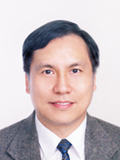 The NTU winner of the National Chair Professorship Award in the category of Engineering and Applied Sciences is Professor Huei Wang. Professor Wang earned his doctorate in electrical engineering from Michigan State University in 1987. He then joined the MMIC (microwave and millimeter integrated circuit) team of the TRW company of America (now Northrop Grunmann), where he achieved many state of the art results in millimeter wave circuits (including up to 200 GHz amplifier, mixer, oscillator, etc). In February 1998 he returned to Taiwan to teach at the Department of Electrical Engineering of National Taiwan University. He spearheaded the design of the millimeter wave laboratory for the Institute of Communication Engineering, and the infra-structure of MMIC. So far the millimeter wave laboratory has a measurement capability of up to 170 GHz, which is not only the best in Taiwan, but also leads the academic circles globally. In the future Professor Wang’s research will be anchored around his laboratory, where he will study the forward-looking millimeter wave technology and the widely used RFIC technology for wireless communications. More importantly, he will try to seek a balance point, on which research and practice can complement each other.
The NTU winner of the National Chair Professorship Award in the category of Engineering and Applied Sciences is Professor Huei Wang. Professor Wang earned his doctorate in electrical engineering from Michigan State University in 1987. He then joined the MMIC (microwave and millimeter integrated circuit) team of the TRW company of America (now Northrop Grunmann), where he achieved many state of the art results in millimeter wave circuits (including up to 200 GHz amplifier, mixer, oscillator, etc). In February 1998 he returned to Taiwan to teach at the Department of Electrical Engineering of National Taiwan University. He spearheaded the design of the millimeter wave laboratory for the Institute of Communication Engineering, and the infra-structure of MMIC. So far the millimeter wave laboratory has a measurement capability of up to 170 GHz, which is not only the best in Taiwan, but also leads the academic circles globally. In the future Professor Wang’s research will be anchored around his laboratory, where he will study the forward-looking millimeter wave technology and the widely used RFIC technology for wireless communications. More importantly, he will try to seek a balance point, on which research and practice can complement each other.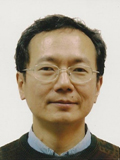 The NTU winner of National Chair Professorship Award in the category of Math and Sciences is Professor George Wei-Shu Hou. He acquired his doctorate in theoretical and particle physics from the University of UCLA in 1985, then did his post-doctoral research at the University of Pittsburgh and the Max Planck Institute of Germany. Later on, he worked as a research fellow at the Paul Scherrer Institute of Switzerland. In 1992, Professor Hou returned to Taiwan to teach at National Taiwan University, his alma mater. Because of his interests in B meson physics and CP violation, he proposed a plan in 1994, and suggested NTU to participate in the Belle experiment of the B factory of Japan. That was the first step toward the creation of a high energy physics laboratory in NTU, and so far it has had many fruitful results. Since 2007, the European Large Hardon Collider’s LHC CMS experiment has been the focus of Professor Hou’s research, whether it be the CMS Integration plan of the National Science Council, or the “Aim for Top University” plan of our University, Professor Hou has been vigorously involved with, and he established a LHC Initiative for the Physics division of the Northern Section of the National Center for Theoretical Sciences to lend theoretical support to the study of high energy physics. The National Science Council just passed Professor Hou’s proposal to climb to the summit this year, in which additional funds were appropriated for the investment in CMS experiments. Dr. Hou has won the Outstanding Research Award from the National Science Council three times (1997-2004, and subsequently as a special research fellow and outstanding scholar), he was elected fellow of the ROC Physical Society (1999), and he received the Asian Achievement Award of the Global Chinese Physical Society in 2003. Professor Hou became a Distinguished professor with tenure of NTU in 2006.
The NTU winner of National Chair Professorship Award in the category of Math and Sciences is Professor George Wei-Shu Hou. He acquired his doctorate in theoretical and particle physics from the University of UCLA in 1985, then did his post-doctoral research at the University of Pittsburgh and the Max Planck Institute of Germany. Later on, he worked as a research fellow at the Paul Scherrer Institute of Switzerland. In 1992, Professor Hou returned to Taiwan to teach at National Taiwan University, his alma mater. Because of his interests in B meson physics and CP violation, he proposed a plan in 1994, and suggested NTU to participate in the Belle experiment of the B factory of Japan. That was the first step toward the creation of a high energy physics laboratory in NTU, and so far it has had many fruitful results. Since 2007, the European Large Hardon Collider’s LHC CMS experiment has been the focus of Professor Hou’s research, whether it be the CMS Integration plan of the National Science Council, or the “Aim for Top University” plan of our University, Professor Hou has been vigorously involved with, and he established a LHC Initiative for the Physics division of the Northern Section of the National Center for Theoretical Sciences to lend theoretical support to the study of high energy physics. The National Science Council just passed Professor Hou’s proposal to climb to the summit this year, in which additional funds were appropriated for the investment in CMS experiments. Dr. Hou has won the Outstanding Research Award from the National Science Council three times (1997-2004, and subsequently as a special research fellow and outstanding scholar), he was elected fellow of the ROC Physical Society (1999), and he received the Asian Achievement Award of the Global Chinese Physical Society in 2003. Professor Hou became a Distinguished professor with tenure of NTU in 2006.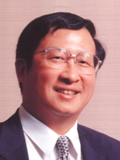 The NTU winner of National Chair Professorship Award in the category of Biology, Medicine, and Agriculture is Professor Ann-Lii Cheng. Professor Cheng graduated from the Department of Medicine of NTU in 1980. After receiving a brief training in internal medicine and oncology in his alma mater, he went to the U.S to study at the Cancer Center of the University of Wisconsin. He earned his doctoral degree in 1994. From 1998 onward, he served as a physician/professor at NTU Hospital. In 2006 he became a Distinguished Professor with tenure of our University, and since 2009 he was the Director of the Department of Oncology of NTU Hospital and the Director of the Institute of Oncology, School of Medicine.
The NTU winner of National Chair Professorship Award in the category of Biology, Medicine, and Agriculture is Professor Ann-Lii Cheng. Professor Cheng graduated from the Department of Medicine of NTU in 1980. After receiving a brief training in internal medicine and oncology in his alma mater, he went to the U.S to study at the Cancer Center of the University of Wisconsin. He earned his doctoral degree in 1994. From 1998 onward, he served as a physician/professor at NTU Hospital. In 2006 he became a Distinguished Professor with tenure of our University, and since 2009 he was the Director of the Department of Oncology of NTU Hospital and the Director of the Institute of Oncology, School of Medicine.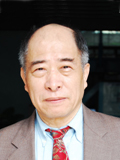 The NTU winner of Academic Award in the category of Engineering and Applied Sciences in Professor Der-Liang Young. After Professor Young received his doctorate from Cornell University in 1976, he stayed in the U.S., working for an engineering firm in civil engineering and aeronautics. His job allowed him to combine theory with practical engineering, and let industry and academia complement each other. In 1983 he returned to Taiwan to teach at the Department of Civil Engineering, and it’s been 27 years since then. He has also been a special researcher at our Institute of Hydro-technology during this period, and he has taught more than 100 master and doctoral students.
The NTU winner of Academic Award in the category of Engineering and Applied Sciences in Professor Der-Liang Young. After Professor Young received his doctorate from Cornell University in 1976, he stayed in the U.S., working for an engineering firm in civil engineering and aeronautics. His job allowed him to combine theory with practical engineering, and let industry and academia complement each other. In 1983 he returned to Taiwan to teach at the Department of Civil Engineering, and it’s been 27 years since then. He has also been a special researcher at our Institute of Hydro-technology during this period, and he has taught more than 100 master and doctoral students.